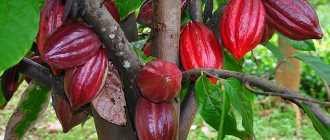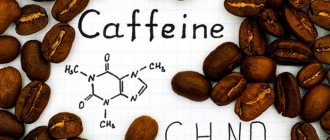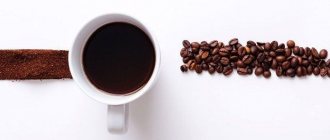What is caffeine
In its pure form these are white bitter crystals. “According to the passport,” the substance has an unpronounceable name: 1,3,7-trimethylxanthine.
It is found in different products and, oddly enough, its “nickname” depends on the product. Caffeine is extracted from coffee, theine from tea leaves, mateine from Paraguayan mate tea, and guaranine from the South American guarana vine. In fact, they are the same chemical compound.
Effect on the body: what do you already know?
The usual set of facts about coffee:
- Helps you wake up and can even cause insomnia.
- Invigorates and makes the brain think faster.
- It makes your heart race and your blood pressure rise.
- Helps sober up and ease hangovers.
- It is a diuretic and causes dehydration.
If you forgot something, don't worry. In any case, these are all general phrases, and not always true. We delved down to the molecular level and prepared for you a real scientific coffee educational program - everything you need to know in one article.
How caffeine gets into the blood
Caffeine has lipophilic
properties - it dissolves well in lipids, that is, in fats. The membranes of our cells, and therefore our biological barriers, are made of lipids.
The walls of the intestine and blood vessels are not an obstacle for the lipophilic substance; absorption occurs quickly and with virtually no loss. Moreover, absorption from liquid products (coffee, energy drink) is faster than from solid products (chocolate or, for example, brownies).
Within an hour, the concentration of the substance in the blood reaches its maximum.
What is the secret of caffeine?
Caffeine is included in most energy drinks
"
Once in the body, caffeine starts a chain reaction. First of all, it fights drowsiness. adenosine
is responsible for this process in the body .
Adenosine slows down nerve impulses, as a result of which the reaction speed decreases, and the person begins to want to sleep. To prevent this, caffeine blocks adenosine receptors
in the brain and other organs, causing adenosine to lose its connection to the receptors and “turn off.” A person gets a “second wind”: he again becomes collected, attentive and active, even if he was unable to rest and recuperate naturally.
The second chain of reactions of the body to caffeine is associated with adrenaline. Caffeine triggers the release of adrenaline
. This, in turn, causes the heart to beat faster and the pressure to rise, as a result, more blood flows to the muscles, and glucose enters the blood.
The third chain is responsible for happiness
, no matter how surprising it may sound.
Caffeine helps increase dopamine
.
Dopamine is produced in the brain when a person feels happy, there is also a feedback: dopamine itself can make a person feel happier even for no apparent reason, which is why many people note that after a cup of tea or coffee they feel better. This is an artificially created feeling of happiness, but the body does not strive to understand the reasons. The danger is that caffeine is addictive
.
Effect of caffeine on the body
The remaining 20% of the substance binds to blood proteins and is distributed to tissues and organs. Although each body system reacts differently, for the most part, caffeine's effects are based on two key mechanisms. Let's talk about them first, and then about how these mechanisms work for different organs.
Mechanism No. 1
Caffeine is like a twin brother to adenosine, one of the four “building blocks” of DNA. We have already talked about it. Here it is important to talk about its other role in the body. Briefly, in three theses:
- There are such molecules - ATP. These are the “batteries” for all cellular processes.
- There are three phosphates in the ATP molecule. We split off one phosphate and get energy. Energy can be extracted from one ATP molecule three times.
- An ATP molecule depleted to zero is adenosine. If a lot of it accumulates, it means the body has spent a lot of energy. It's time to switch to energy saving mode.
The scheme is this: there are a lot of ATP residues, they are caught by receptors - neurons switch the body to an economical mode. Caffeine does a simple thing - it sits on the receptors itself, turns them off, but there is no “need to rest” signal. As a result, fatigue remains a secret to ourselves, and all our organs continue to invigorate even with “dead batteries.”
Mechanism No. 2
Caffeine blocks the enzyme that breaks down cAMP molecules (believe me, you don't need to know the decoding). Everything you need to know is also in the abstract:
- Some hormones are too large and cannot penetrate the cell membrane to transmit their signal to the target.
- cAMP - cellular “couriers”. They are able to receive signals from hormones and transmit them inside the cell.
- If the enzyme is blocked, it stops destroying cAMP molecules, and their concentration in cells increases.
As a result, there are more “couriers” in the cell, and the effect of hormones is enhanced. Exactly what action depends on what hormone and what cell we are talking about.
Effect on the brain
There is a special blood-brain barrier between the blood and the brain. Lipophilic caffeine easily overcomes it and “sticks” to adenosine receptors on neurons. In addition, the effect of adrenaline on neurons is increased through cAMP.
Result: the brain works faster and does not pay attention to fatigue. As long as the body has the resources.
Effect on the heart
Adenosine receptors are also found on myocardial cells. Activation of these receptors reduces heart rate, improves blood flow to the heart, and lowers blood pressure.
Caffeine blocks the receptors and therefore gives the diametrically opposite effect. In addition, due to the large amount of cAMP, the heart feels the adrenaline effect more acutely.
Result: the heart begins to pound harder and continues even when it really needs to rest. Hello, tachycardia.
Effect on the stomach
To digest food, special cells secrete hydrochloric acid into the stomach. Caffeine is a stimulant of this process. The mechanisms of action are still the same. Secretory cells become less sensitive to adenosine - they ignore the “energy-saving mode” and continue to secrete acid to the fullest. In parallel, cAMP increases the sensitivity of the cell to histamine, a hormone that enhances acid production.
Result: active release of hydrochloric acid. Now do you understand why it is better to drink coffee immediately before or immediately after a meal?
In general, if you do not abuse coffee, then its effect on people’s health is quite positive.
What are the harms of caffeine?
Caffeine is the most popular natural stimulant, which reduces the feeling of fatigue, increases concentration, and improves mood. The easiest way to get caffeine is by drinking a cup of tea or coffee. These 2 drinks are the most popular all over the world. It is difficult to imagine a person who would not start his day with aromatic tea or invigorating coffee. According to 2021 data, the market for these drinks is growing annually by 6% and this trend is only intensifying, thanks to active advertising in all kinds of channels. But are tea and coffee healthy, or rather, the caffeine that these drinks contain, and is it worth consuming them in such quantities? Let's figure it out.
What are the harms of caffeine?
Of course, coffee and tea bring a lot of positive things into our lives. Many simply cannot imagine their life without the taste of coffee and tea, not to mention the invigorating effect that we get. 100 grams of tea contains 11 mg of caffeine, and the same serving of coffee contains 40 mg. Doctors do not recommend consuming more than 300 mg of caffeine per day. This is a general recommendation and it is worth thinking about whether caffeine is beneficial?
Should you drink coffee in the evening?
Yes, coffee will invigorate you, which is undoubtedly good in the morning or if you can’t go to bed and need to maintain maximum productivity. The effect of caffeine lasts up to 6 hours, so it is not recommended to drink it in the afternoon, because it can lead to insomnia.
Can coffee and tea be combined with medications?
Caffeine enhances, weakens, or completely changes the effect of the pills, so it is highly recommended not to take medications with coffee or tea. It is best to take the tablets with plain water, as many other drinks can affect the effect of the drugs in one way or another.
Caffeine increases stress and anxiety
Having an stimulating effect, caffeine stimulates the production of adrenaline, norepinephrine and cortisol. As a result, you end up with too much energy, your body becomes stressed, and you may become twitchy and nervous.
And what else?
Caffeine increases blood pressure, which can lead to negative effects. It is not recommended to consume caffeine for those who are planning a pregnancy or are already expecting a child. If you suffer from ulcers, gastritis and other gastrointestinal diseases, then doctors recommend completely giving up coffee, because this drink, due to its high acidity, irritates the walls of the stomach. In addition, coffee and tea have a very negative effect on the absorption of iron, which, in turn, is vital for normal life support.
Of course, we do not recommend completely giving up coffee or tea, especially if these drinks bring you joy and improve your mood. But how to minimize the harm from the effects of caffeine on the body? Make it a rule to drink fermented fireweed tea at least in the evening. This way you will strengthen your immune system, relieve chronic inflammation of the gastrointestinal tract, and normalize the quality of your sleep. High-quality fermented fireweed tea has only a beneficial effect on the body.
Ivan tea instead of coffee and tea. What are the benefits of Ivan tea?
Blooming Sally
protects against colds and viruses, which is especially important now. We recommend drinking Ivan tea on a regular basis to feel the effects of the Russian drink. Ivan tea contains more vitamin C than lemon. And there are also vitamins B, potassium, PP and many other substances that protect our health in difficult times.
Here _
Elena Lesiovskaya, a scientist and doctor with 40 years of practical experience, Doctor of Medical Sciences, professor, author of numerous courses on herbal medicine for doctors, pharmacists, health specialists, tells why fireweed is very useful.
And here is
another expert opinion from Lyudmila Posevina, a certified nutritionist.
Blooming Sally
invigorates, like coffee and tea, but does not contain caffeine. The magic of fireweed also lies in the fact that fireweed can calm. It turns out that fireweed has two sides to its effect: it will give you vigor, which will help a lot in the morning, and it will calm you down, which will help you fall asleep easier.
And what else?
Blooming Sally
has a gentle effect on the gastrointestinal tract, improving its functioning and establishing metabolic processes.
It also helps blood formation, understanding hemoglobin (unlike coffee). Ivan tea is also highly recommended for men's health. In addition, fireweed is not prohibited for pregnant women and children (but we advise you to check with your doctor). Ivan tea fights free radicals, stimulates collagen synthesis, heals wounds and nourishes the skin with vitamins from the inside. Why not have a cup or two during the day? Drink high-quality
Ivan tea and be healthy!
Benefit for health
- Prevention of neurodegenerative diseases.
Coffee has been proven to help prevent Alzheimer's and Parkinson's diseases. For example, in an experiment with mice, the amount of “bad” abnormal proteins in the area of the brain responsible for memory decreased. - Stroke Prevention
.British scientists conducted a study with a group of 83,284 people who were given 2-4 cups of coffee daily for several months. Let's monitor the well-being of the experimental subjects, scientists concluded: drinking coffee reduces the risk of stroke by 20%.
- Cancer prevention.
There are several statistical studies that show that people with a moderate love of coffee are less likely to get cancer. This is probably due to the fact that it contains powerful antioxidants. They are approximately 500 times stronger than green tea extract or vitamin C.
Can caffeine be considered a drug?
When we talk about drugs, we usually think of illegal synthetic substances or herbal drugs that are legalized in some countries. On the one hand, caffeine does not harm the body as much as heroin or other hard drugs. On the other hand, caffeine has the same characteristics as drugs
:
- may be addictive;
- in large doses is harmful to the body;
- cessation of use causes withdrawal symptoms.
If you regularly consume large amounts of caffeine, addiction and “coffee addiction” can develop over time, which is why caffeine is sometimes called a “legal drug.” If a person consumed caffeine in large doses for a long time and then stopped doing so, then he has every chance of experiencing a whole “bouquet” of unpleasant symptoms associated with the lack of caffeine. “Coffee withdrawal” will begin 12-14 hours after the last “dose” of caffeine.
Caffeine withdrawal syndrome
may manifest itself in different ways. The most common signs are the following:
- depression;
- problems with concentration;
- chills;
- drowsiness;
- headache;
- muscle pain;
- constipation, etc.
If you start noticing these symptoms for no apparent reason, try to see if they are related to drinking or not drinking caffeinated drinks. If you are addicted, you may be consuming too much caffeine. You need to start by reducing your daily dose. If there is no improvement, you should consult a doctor.
Harm of caffeine in case of overdose
- It is important to remember: coffee has zero calories. A cup of Americano does not give us new energy, but it helps burn existing reserves. It is necessary to replenish reserves in time, otherwise physical exhaustion and a nervous breakdown are not far off.
- May stimulate gastric ulcers, inflammation of the esophageal mucosa and gastroesophageal reflux disease.
- Increases heart rate. In itself, this is not so scary, but if your luggage already has coronary heart disease or organic myocardial damage, even a small “additive” can lead to serious complications.
- Migraine trigger. Modern research confirms that coffee can provoke migraine attacks. Again, we are talking about large doses.











